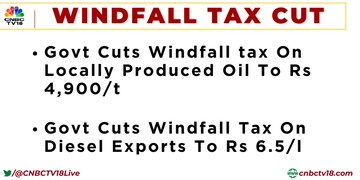The government has decided to slash the windfall tax or the special additional excise duty (SAED) on domestically produced crude oil and diesel exports starting Friday, December 2.
Following the fortnightly review, the windfall tax on crude petroleum produced by firms such as state-owned Oil and Natural Gas Corporation (ONGC) has been nearly halved from Rs 10,200/tonne to Rs 4,900/tonne. The additional duty on diesel has been brought down to Rs 8 per litre from Rs 10.50 per litre earlier.
The levy on petrol continues to be nil and that on aviation turbine fuel (ATF) will continue at Rs 5 per litre.
The windfall tax or SAED is a one-off tax imposed by a government on a company or industry when it benefits from something that it is not responsible for, the financial gain that ensues is called windfall profits.
Earlier on Tuesday,
Revenue Secretary Tarun Bajaj said he believes if the windfall tax is done away with, it'll be good for the economy because it would mean that crude prices are down and consequently, prices of diesel and petrol products.
“To that extent, our import bill reduces, and our current account deficit improves. So if that happens, that is far, far better than the small amount of windfall taxes that will be collected through this process,” he told CNBC-TV18 in an exclusive interview.
India first imposed
windfall profit taxes on July 1, joining a growing number of nations that tax super normal profits of energy companies. But international oil prices have cooled since then, eroding the profit margins of both oil producers and refiners. Export duties of Rs 6 per litre (USD 12 per barrel) were levied on petrol and ATF and Rs 13 a litre (USD 26 a barrel) on diesel at first and have been revised several times.
While windfall profit tax is calculated by taking away any price that producers are getting above a threshold, the levy on fuel exports is based on cracks or margins that refiners earn on overseas shipments. These margins are primarily a difference of international oil price realised and the cost.
Bajaj noted that the day the windfall gains tax was introduced, there was a lot of apprehension, including in the media that it's there to stay, but within 14 or 15 days, it was changed — increased or decreased at regular intervals. So, as the prices come down, the windfall taxes will either reduce or will go away, he assured.
Globally, oil prices edged lower in early Asian trade on Friday as the US dollar pared some losses, while easing COVID-19 curbs in two Chinese cities limited losses. Brent crude futures were down 11 cents or 0.1 percent at $86.77 per barrel by 6:58 am, while US West Texas Intermediate (WTI) crude futures lost 14 cents or 0.2 percent to $81.08 per barrel.




